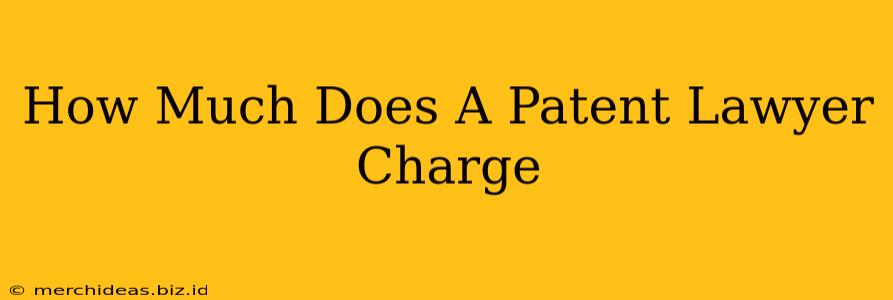The cost of hiring a patent lawyer can vary significantly, making it crucial to understand the factors influencing their fees. This guide breaks down the pricing structures, average costs, and how to find affordable legal representation for your patent needs.
Understanding Patent Lawyer Fees: More Than Just an Hourly Rate
Patent lawyers don't operate on a single, fixed price. Their fees are influenced by several key factors:
1. Hourly Rates: The Most Common Structure
Many patent lawyers bill clients hourly. Hourly rates can range dramatically depending on the lawyer's experience, location, specialization (e.g., biotechnology, software), and reputation.
- Entry-level attorneys: Might charge between $200 and $400 per hour.
- Mid-level attorneys: Typically charge between $400 and $700 per hour.
- Senior partners/highly experienced attorneys: Can charge upwards of $800 per hour, or even more in specialized fields.
Remember, the total cost will be the hourly rate multiplied by the number of hours spent on your case. This can easily accumulate, especially for complex patent applications.
2. Project-Based Fees: A More Predictable Approach
Some patent lawyers offer project-based fees, quoting a fixed price for specific tasks like drafting a patent application or responding to an office action from the patent office. This offers more predictability, though it might be harder to get a quote upfront for extremely complex or uncertain projects.
3. Contingency Fees: A Risky But Potentially Rewarding Option
In some limited situations, patent lawyers might agree to work on a contingency fee basis. This means their payment is contingent on the successful outcome of the case, often a percentage of any financial recovery or licensing agreement. However, these are less common for patent applications and are usually reserved for litigation.
4. Retainer Fees: Securing Ongoing Representation
Some lawyers require a retainer fee, an upfront payment that secures their services for a specific period or project. This acts as a deposit against future work and ensures availability.
Factors Affecting Patent Lawyer Costs
Beyond the billing structure, several other factors impact the overall cost:
- Complexity of the invention: A highly complex invention requiring extensive research and detailed documentation will cost more than a simpler one.
- Prior art search: Thorough searches for existing patents and publications are crucial; these searches can be time-consuming and increase costs.
- Patent prosecution: The process of interacting with the patent office, responding to office actions, and amendments can significantly affect costs and timelines.
- Geographic location: Patent lawyers in major metropolitan areas (like New York, Boston, or Silicon Valley) typically charge higher rates than those in smaller cities.
- Lawyer's experience and expertise: A specialist with a strong track record in your field will likely charge a premium.
How to Find Affordable Patent Legal Representation
- Shop around: Obtain quotes from several different patent lawyers to compare pricing and services.
- Consider smaller firms or solo practitioners: These might offer competitive rates.
- Look for pro bono or reduced-fee services: Some organizations provide legal assistance to inventors with limited financial resources.
- Clearly define the scope of work: Avoid ambiguity in the agreement to prevent unexpected costs.
- Negotiate fees: Don't be afraid to discuss the fees and payment arrangements with the lawyer.
Conclusion: Budgeting for Your Patent Application
The cost of hiring a patent lawyer is a significant investment, but securing quality legal counsel is essential for protecting your intellectual property. By understanding the factors influencing legal fees, comparing options, and effectively managing your budget, you can find the right legal representation to navigate the complexities of the patent process. Remember to thoroughly research and communicate your needs clearly to achieve the best possible outcome.
